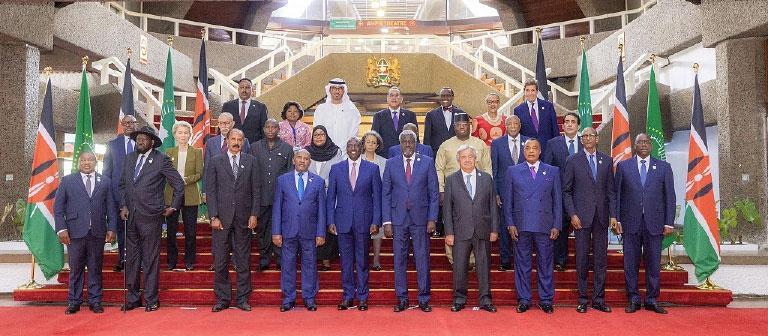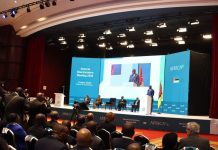Africa-Press – Eritrea. The first-ever African Climate Summit, held in Nairobi, concluded this week with the issuing of a historic declaration that called for an urgent restructuring of the way wealthier nations engage with the continent. The Nairobi Declaration also urged the international community to back a surge in renewable energy. Looking forward, the declaration will help to define the shared position of the African continent ahead of an upcoming United Nations climate conference in New York and the COP28 global climate talks scheduled for later this year. (COP28 refers to the 28th Conference of the Parties of the United Nations Framework Convention on Climate Change, scheduled for later this year in the United Arab Emirates.)
The landmark gathering, which began Monday and ended Wednesday and was co-hosted by the African Union and Kenyan Government, drew numerous African heads of state and government and tens of thousands more participants and delegates from around the world. Among the key themes of the breakthrough summit and its final declaration was the imperative to ensure that Africa be regarded as a potential source of solutions, rather than portrayed strictly as a host to problems. “Africa possesses both the potential and the ambition to be a vital component of the global solution to climate change,” states the final declaration, released on Wednesday.
While climate change and its impacts affect people everywhere, they disproportionately harm the poorest and the most vulnerable, especially women, children, the elderly, and persons living with disabilities. Moreover, the impacts of climate change are felt most by those people who are least responsible for rising carbon emissions and global temperatures – particularly those in Africa.
African countries are among the most vulnerable to the impacts of climate change, experiencing the dire impacts of the climate crisis including withering drought, flooding, extreme weather temperatures, and rising sea levels. Last year, more than 7.5 million internal disaster displacements were registered on the continent, while millions of people continue to be impacted by an extreme hunger crisis in parts of East Africa – a crisis that has been made worse by the repeated failure of rainy seasons.
Yet, even as the continent is especially vulnerable to the impacts of climate change, the gathering focused on the fact that Africa can also be a source of solutions. African countries boast abundant and diverse natural resources, youthful populations, critical minerals, and arable land, all of which offer numerous opportunities and vast potential to drive low-carbon green growth and spur climate action throughout the continent and the world. As stated by a Kenyan official: “We aim to start changing the conversation from Africa the victim of hunger, famine, and floods [to] an Africa that is willing and ready to attract capital that is timely, equitable and at scale to lead the world in tackling climate change.”
The declaration also shines a critical light on the need for the global community to fulfill its obligations and keep financial promises to fight climate change. Although African countries have been promised significant support over the years, comprehensive follow-up on commitments has been sorely lacking. A report released last year by the Climate Policy Initiative found that Africa has received about only 12 percent of the finance it needs to cope with climate impacts, and a 2022 United Nations report also estimated that the continent loses from $US7bn to $US15bn annually because of climate change. Moreover, past analyses have shown that some countries, such as the United States, the United Kingdom, and Canada, have fallen billions of dollars short of their “fair share” of climate funding for developing countries, while most climate financing actually goes to middle-income countries, rather than the poorest. Myriad reports also indicate that even greater funding than has yet been forthcoming is required to help developing countries cut their greenhouse gas emissions and cope with the effects of climate breakdown.
Another significant point raised in the final declaration was the fundamental need to reform the global financial system that has left African nations paying 5 to 8 times more to borrow money than others, worsening the debt crisis for many. Proposals include increasing concessional lending, providing grace periods, and extending sovereign debt tenors, all of which would help could offer relief for indebted countries and result in the release of money that could be invested in renewable energy, conservation, and climate change adaptation. According to international organizations, many African countries are heavily burdened by annual debt servicing costs that are approximately the same amount as their climate financing requirements. What is more, a significant percentage of international climate finance is extended in the form of loans, rather than grants, which is a major difference that can push countries already trapped in debt into further misery.
The declaration, adopted unanimously, thus demonstrating the continent’s unwavering collective commitment and resolve, additionally calls for Africa’s vast mineral wealth to be processed on the continent, noting that, “decarbonizing the global economy is also an opportunity to contribute to equality and shared prosperity,” while also proposing a new “loss and damage” fund due to be established at COP28 and carbon taxes on sectors like fossil fuels, maritime transport, and aviation.
Eritrea’s participation at the Africa Climate Summit
Upon the invitation of Kenyan President William Ruto, who served as the summit’s host, Eritrea’s President, Isaias Afwerki, accompanied by Osman Saleh, the country’s foreign minister, attended the summit in Kenya. On the margins of the summit, President Isaias conducted several meetings with leaders and representatives of countries and organizations.
During his address, President Isaias cautioned that “the gravity and urgency of the [climate change] situation will be downplayed only at our own, collective, peril,” and went on to urge that, “Africa mobilize its own resources rather than extend hands for handouts that may aggravate the existing situation by inviting interference and corrupt practices while mobilizing our own resources will be enabling and motivating creativity at the level of the continent.”
For Eritrea, a young, developing country, located in a region that is on the frontlines of the climate change crisis, the summit and many of the issues it raised were highly pertinent. The country is vulnerable to a number of climate-related hazards, such as recurrent droughts, flooding and storms, high winds (especially within coastal areas), locust swarms, and volcanic activity. Annual greenhouse gas (GHG) emissions in the country remain relatively low and there are only small fluctuations per year. In 2018, GHG emissions were approximately 6.396 megatonnes of carbon dioxide equivalent (Mt CO2 eq.), about a 20.17 percent (or 1.073 Mt) increase from 2000 emissions and a slight decrease of 0.37 percent (or 0.0237 Mt) from 2015 emissions. Overall, the country accounts for among the smallest global shares of total global GHG emissions.
Notably, however, despite a range of different challenges, for years Eritrea has been making considerable efforts and investing resources toward climate change mitigation and adaptation, risk reduction, and disaster rehabilitation. It has signed and ratified a number of international climate change agreements, established enclosures and protected areas, expanded sustainable irrigation schemes (including drip and sprinkler systems), and constructed hundreds of terraces, dams, and ponds. (The number of big and small dams has grown exponentially since the onset of independence, from 138 to 785 in 2021, with hundreds of millions of cubic meters of water impounded in reservoir structures nationwide.) As well, it has developed plans for the desalination of seawater for domestic and economic sectors, while households and communities nationwide, especially those in at-risk areas, also receive considerable support with adaptation strategies and technologies, helping to reduce vulnerability, strengthen resiliency, and secure livelihoods.
In addition to all of the above, renewable energy is being prioritized (which will help to minimize the dependence on unsustainable imported fossil fuels and reduce emissions from national power generation), while steps are actively being taken to improve energy efficiency and promote clean alternatives in transport, manufacturing, and household consumption.
One unique intervention has been the introduction of improved traditional stoves, locally known as “Adhanet”, which are energy efficient (decreasing consumption by 50 percent), minimize deforestation, and reduce safety and health hazards. Designed by the Ministry of Energy and Mines and distributed by the Ministry of Agriculture, approximately 170,000 of these units have been installed in households and communities nationwide since 1998. Additionally, a number of projects are in place to conserve, restore, and enhance natural areas, including regular nationwide afforestation campaigns involving the active participation of communities, students, and youth groups, as well as water and soil conservation programs.
While all of these efforts and initiatives are certainly significant, noteworthy, and much-needed, it is absolutely vital that Eritrea, along with other African countries that are bearing the brunt of the impact of climate change, continue to plow ahead to ensure a sustainable, green future and also receive tangible, concrete support. As stated in the Nairobi Declaration, “No country should ever have to choose between development aspirations and climate action.”
For More News And Analysis About Eritrea Follow Africa-Press







